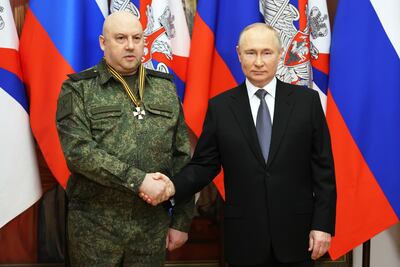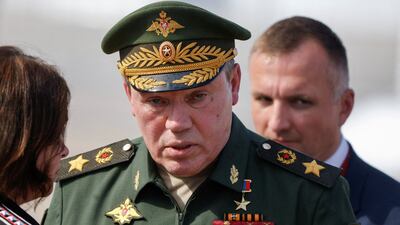The appointment of Russia’s top general to command the Ukraine operation signals Moscow’s intent to launch a major new offensive, military analysts have told The National.
But it could also suggest desperation similar to that of a football club hoping that, by changing their manager, their luck might change, others have said.
As chief of the general staff, Gen Valery Gerasimov might have hoped to oversee the war from the comfort of his Moscow headquarters, but he will now be much closer to the front line as the new theatre commander.
There has been much speculation on the thinking behind the general’s sudden and public appointment, with various motivations given.
A close confidant of President Vladimir Putin, Gen Gerasimov is now charged with reversing Russia’s dismal war effort, as the Ukrainians have retaken vast areas of territory.
Moscow's troops have been hit by astonishingly high casualties and lost much of their equipment.
The Kremlin is in a desperate strait: Withdrawal is not an option and neither is going nuclear. Instead, the only way ahead is a refreshed, revitalised military that can thump its way through Ukraine’s adept forces.
At 67, Gen Gerasimov has spent a lifetime in the army and more than a decade at its head. He was the architect of major modernisation reforms that had — apparently — turned it into a modern fighting force.
He is regarded as politically astute — he would not have lasted so close to Mr Putin if he was not — but also has a degree of military nous that led to the “Gerasimov Doctrine”, which states that modern warfare is something similar to the Libya conflict, with a focus on armour, drones and information warfare as well as other non-military activities.
Unfortunately for him, what was written down failed to survive contact with Ukraine’s military.
That, Mr Putin will be hoping, will change when his favoured general enters the theatre of combat.
“A plausible scenario is that inside the Kremlin, Gerasimov has been arguing for improved military strategy and improved command and control,” said Russian military expert Brig Ben Barry.
“If so, it may be that Mr Putin has said, ‘well, the best person to implement these ideas is the person who proposed them’.”
That grand idea could well be to mount a “major offensive” this year using an estimated 150,000 uncommitted mobilised troops and potentially a similar number of conscripts.

Quantity, as the Russians regularly demonstrated in the Second World War, has its own quality.
That war, too, showed Moscow’s commanders should never be underestimated.
Brig Barry, of the International Institute for Strategic Studies think tank and former British army officer, pointed to the similarities between Ukraine and the decisive Battle of Kursk in 1943, in which the Germans were drawn deep behind defensive Russia lines, were weakened then heavily counter-attacked.
“The Russian are anticipating new Ukrainian offensives, particularly once they've built their new armoured formations,” he told The National. “It may be their first priority is to actually defeat those offensives then go over on to their own offensive as they did at the Battle of Kursk.
“Satellite imagery already shows their defensive preparations with long belts of obstacles, trenches and Dragon's Teeth, positions prepared in depth was exactly the tactic they used in Kursk to blunt the major German offensive.”
Other thinking behind Mr Putin’s surprise and unforeseen move is that it is signalling his intent for a “long war” that will ultimately be unacceptable to the West, which is suffering from high energy prices.
Bob Seely, MP, a former soldier who has written academic papers on Ukraine and Russia, suggests Gen Gerasimov is the military leader “Mr Putin trusts the most” and “may give Mr Putin more of a direct voice and direct communication” in the battle.
But as army chief, Gen Gerasimov has overseen much of the modernisation of Russian forces that has demonstrably failed.
“Mr Putin might also be saying, ‘right, you screwed this up, you go rescue it’,” Mr Seely said.
Mr Putin will not be relying on Gen Gerasimov’s tactical acumen, as Gen Sergei Surovikin, who now becomes his operational deputy, “is a brutal but strong leader”.
“The problem is that the Russian military has so many structural problems that getting a new commander is not really going to make much difference,” Mr Seely added.
In recent weeks, the mercenaries fighting in Ukraine — part of the notorious Wagner Group — have gained significant prominence, particularly with its boss Yevgeny Prigozhin’s boast that he had taken the town of Soledar, succeeding where the regular army had failed.
Gen Gerasimov's deployment might also be to re-establish the army’s per-eminence and restore its reputation while bringing the mercenaries to heel.
Former tank commander Col Hamish de Bretton Gordon believes Gen Gerasimov’s appointment was a “last throw of the dice” and that he was “not a winning general”.
“Mr Putin is desperate and he is trying anything but I don't think Gerasimov will bring anything to the party,” he said.
He, too, thinks it could be a response to the Kremlin’s fears over western heavy armoured formations arriving in Ukraine.
“The Russians are really concerned because they're fighting a static battle but if Ukraine is enabled to get into manoeuvre warfare, then once those armoured formations get behind the Russians, they're finished.”
He added that, with Gen Surovikin only serving three months as operational commander, “changing your generals every five minutes really shows that things aren't going well”.
“The whole command and control in the Russian army is absolutely shot to pieces,” he added.
The only hope is that Gen Gerasimov would bring a “more coherent, comprehensive and unified approach” rather than the current piecemeal actions.
“There is also a football analogy here,” he added. “They've tried everything, even the dreadful violence of Surovikin, but nothing is working, so why not change the boss? Maybe it will lead to a change of luck.”
The Institute for the Study of War, a Washington research unit, concluded that Russian’s lamentable military was unlikely to change with the appointment.
“Gen Gerasimov will likely preside over a disorganised command structure plagued by endemic, persistent and self-reinforcing failures that he largely set into motion in his initial role before the invasion of Ukraine,” it reported.

